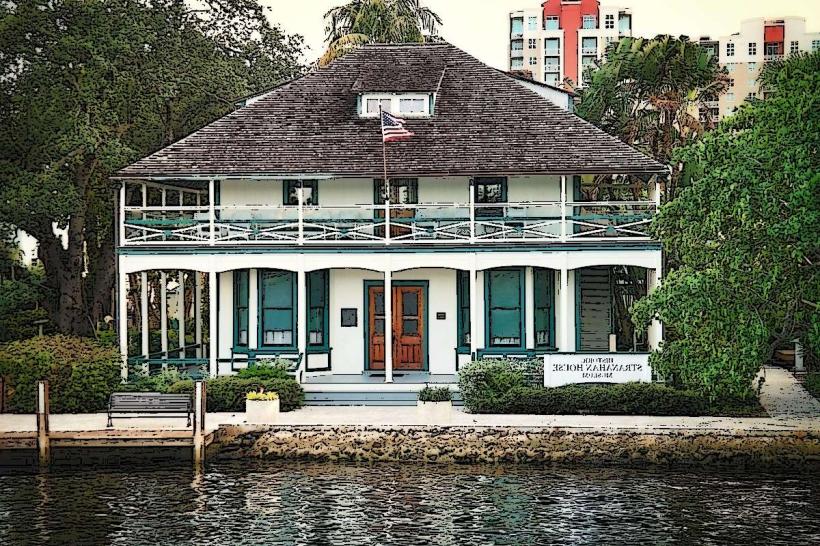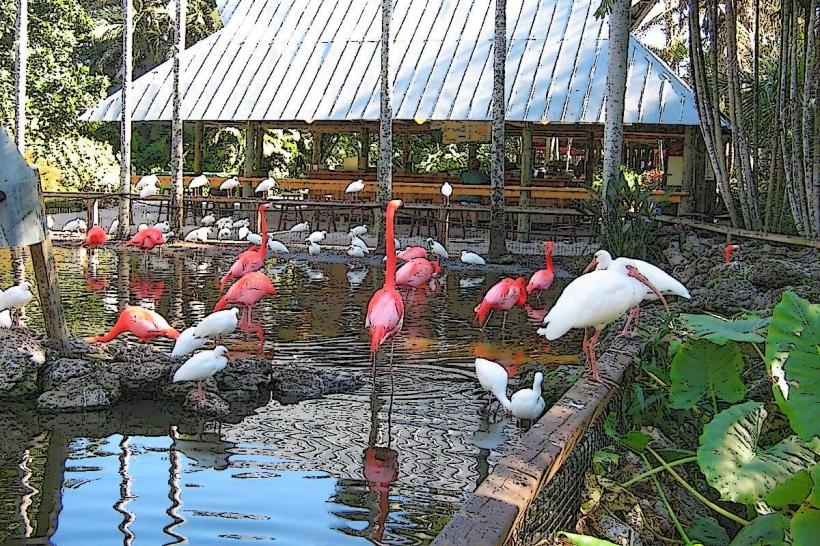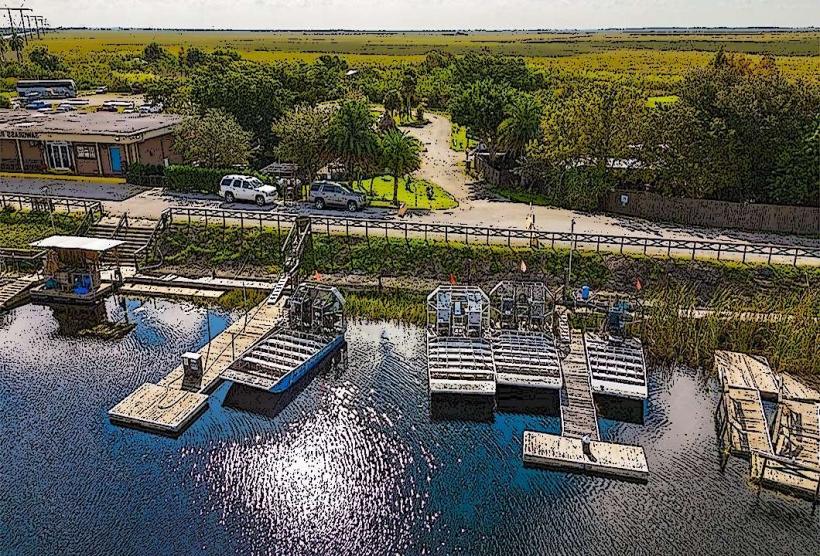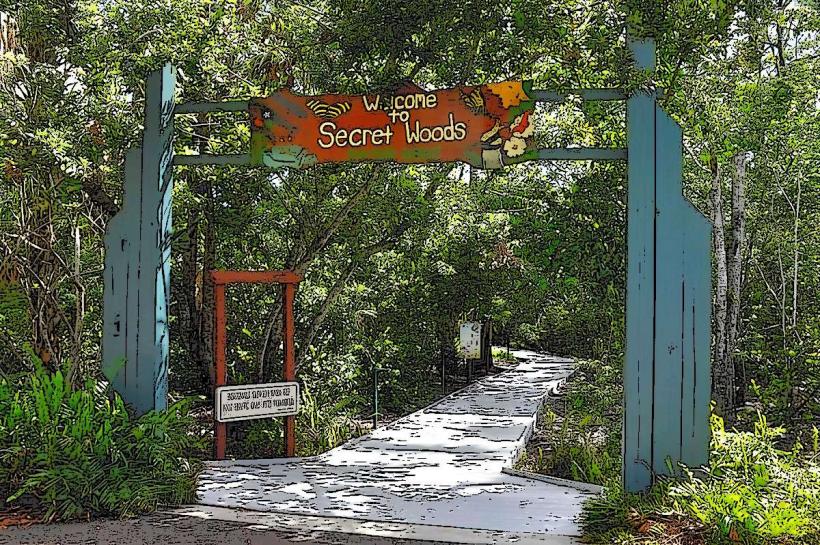Information
Landmark: Palm Beach ZooCity: Fort Lauderdale
Country: USA Florida
Continent: North America
Palm Beach Zoo, Fort Lauderdale, USA Florida, North America
The Palm Beach Zoo & Conservation Society, located in Dreher Park, West Palm Beach, Florida, is a 23-acre zoological park with a mission to connect people with wildlife and nature. Established in 1957, the zoo has grown to house over 500 animals from more than 190 species, with a strong emphasis on conservation, particularly focusing on endangered species. The zoo is accredited by the Association of Zoos and Aquariums (AZA) and the World Association of Zoos and Aquariums (WAZA), ensuring high standards of animal care and conservation efforts.
Key Features and Exhibits:
Tiger Forest:
This exhibit features Malayan tigers, one of the most endangered tiger subspecies. The exhibit is designed to mimic their natural habitat, with elevated trails that allow the tigers to move freely between different sections, replicating the conditions in the wild where they roam large territories. The tigers in this exhibit include Olan, Api, and Kadar.
The design of the exhibit allows visitors to observe the tigers from various vantage points, offering an immersive experience while keeping the safety of both visitors and animals in mind.
Tropics of the Americas:
This exhibit showcases wildlife from Central and South America, highlighting the rich biodiversity of the region. Some of the animals found here include jaguars, capybaras, giant anteaters, and various species of monkeys. The exhibit also features plants and replicas of Mayan culture, offering both an educational and cultural experience.
The Tropics of the Americas aims to provide an understanding of the delicate ecosystems of the region and the importance of preserving them.
The Islands:
This section of the zoo focuses on animals native to various islands around the world, such as Australia, Madagascar, and Central America. Visitors can see animals like koalas, lemurs, and sloths.
The zoo has a commitment to preserving these island ecosystems, which are often fragile and home to unique species that are at risk due to habitat destruction and other environmental threats.
Florida Wetlands:
The Florida Wetlands exhibit is a recreation of the state's natural cypress swamps and marshes. It is home to iconic species such as the Florida panther, alligators, and otters.
This exhibit educates visitors about the importance of wetlands in maintaining biodiversity and the threats posed by human activity, including urbanization and climate change.
Animal Experiences:
In addition to walking through the exhibits, the Palm Beach Zoo offers a variety of up-close animal experiences. Visitors can book special encounters with some of the zoo's most popular residents. These experiences are educational, providing behind-the-scenes insights into animal behavior, conservation efforts, and the daily care required to keep the animals healthy.
Some of the available experiences include:
Sloth Encounters: Meet and interact with the zoo's resident sloths. Visitors can learn about their slow-moving lifestyle and their role in ecosystems.
Koala Encounters: The zoo is one of the few in the U.S. with a koala exhibit. Visitors can get close to these iconic Australian marsupials.
Panther Encounters: For a more thrilling experience, visitors can meet the zoo's Florida panther, a species at the heart of local conservation efforts.
These experiences are available at additional cost and require advance booking.
Conservation Efforts:
The Palm Beach Zoo is deeply committed to wildlife conservation, supporting various global initiatives. Some of its most significant conservation projects include:
Jaguar Conservation: The zoo supports efforts to protect jaguars in their native habitats, particularly in the wilds of Central and South America. The zoo works with local organizations to ensure sustainable populations of jaguars and protect their natural environments from deforestation and poaching.
Giant River Otters: The zoo is involved in the conservation of giant river otters, particularly in Bolivia’s Madidi National Park. The conservation programs focus on habitat protection, sustainable development practices, and community engagement to preserve the otter populations.
Biodiversity Education: The zoo engages in numerous education programs designed to raise awareness of the importance of biodiversity. Visitors learn about the fragile ecosystems around the world and how they can help protect them.
Hours of Operation:
The zoo is open daily from 9:00 AM to 5:00 PM, with the last admission at 4:15 PM. It is closed on major holidays like Thanksgiving and Christmas Day.
Admission:
Adults (13–59): Starting at $39.00.
Seniors (60+): Starting at $37.00.
Children (3–12): Starting at $33.00.
Toddlers (0–2): Free admission.
There is also a military discount where active, reserve, and retired military personnel receive free admission, and up to three accompanying guests receive 50% off admission.
Parking:
Parking at the Palm Beach Zoo is always free.
Special Programs:
The zoo offers various educational programs and events throughout the year. These programs are designed to engage children and adults alike, with activities such as animal feedings, educational talks, and special events like holiday-themed attractions.
The Palm Beach Zoo stands out not only as a place for entertainment and family fun but also as a vital player in global wildlife conservation efforts, making it an essential destination for both animal lovers and those interested in supporting conservation initiatives.
















